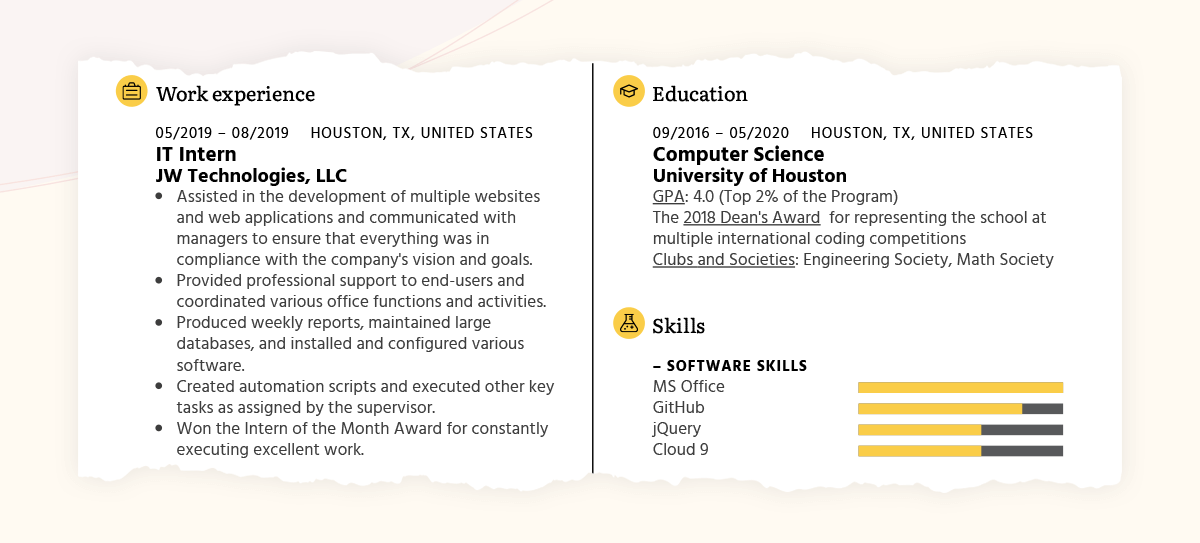It’s no wonder why simple questions like “How far back should a resume go?” or “Does a resume have to include all the jobs?” can be challenging to answer nowadays.
Our world is vastly different than it was just two decades ago. People job-hop at nearly twice the rate, and staying at one job for 10+ years has become very uncommon.
So, how do you decide what to include on your resume without making it too long or leaving out important details?
We’ll go over how far back should your resume go in 2025, regardless of whether you're
- a student
- a fresh graduate
- an experienced professional
Plus, we look at how many jobs to include, when to remove old jobs and answer your FAQs.
- How far back should a resume go in 2025?
- Student or recent graduate work experience (0 – 2 years of experience)
- Entry level work experience (2 – 5 years of experience)
- Mid-level and experienced professionals (more than 5 years of experience)
- How many jobs should I put on my resume?
- When to remove old jobs from a resume ?
- FAQ: How far back should a resume go?
How far back should a resume go in 2025?
The common advice is to keep the work experience in a resume between 10 to 15 years. Doing so will give your hiring manager a general outline of your career beginnings, your growth, and where you find yourself now.
However, this rule isn't set in stone, and the answer can vary depending on a few factors, such as:
- How long you’ve been in the workforce;
- Does your experience align with your job target;
- And your qualifications.
Generally, if a job provided you with valuable experience and skills that align with your target job, then you want to add it to your resume.
On the other hand, if your past experience from years ago isn't relevant for the desired job, you should consider skipping it and giving more attention to other sections — like skills and resume objective.
Student or recent graduate work experience (0 – 2 years of experience)
As a student or recent graduate, you're probably not concerned about how far back your resume should go.
In fact, you might be concerned about the opposite. Do you even have enough years of experience on your resume?
All we have to say to this is — don’t worry. It's expected for you to have minimal experience when entering the workforce. Besides, you’ll realize in a bit that you’re more qualified than you think.
You don’t need to have years of experience on your resume to show your employer you’re the right candidate for the job.
You can do so by highlighting your:
- Transferable skills (gained while you volunteered, interned, fundraised, or co-worked on a project);
- Hard skills (like programming languages, data analysis, SEO, etc.)
- Relevant projects, dissertations, or research.
- High-school and college achievements;
- Part-time and summer jobs;
As you can see, as a recent graduate your best strategy is to focus on your skills. A resume that is skills-based, is also called a functional resume. It's also great for people changing careers and those with employment gaps, since it takes away attention from the lack of work experience.
Just make sure that what you jot down in your resume is relevant to the job and that it reflects your character and work ethic. Most employers are quick to notice when a resume is full of fluff.
Also, just because you weren't paid as an intern and/or volunteer doesn't mean what you did wasn't work. You can still write them down as work experience, for example:

Entry level work experience (2 – 5 years of experience)
If you're someone with entry-level work experience, it’s time to minimize the importance of your college experience.
That means removing your college courses, awards, school projects, and GPA from your resume.
Instead, your main focus should be on your post-graduation experience. Whether that be your first job(s), internships, or volunteering.
Because you're still fresh into the workforce, you might find that your resume’s job experience is lacking.
In such cases, apart from including a work experience section, you can complement it with other resume sections, such as:
- Skills. Regardless of the job and your experience level, skills are essential to any resume. Whether that be hard, soft, or transferable skills. Or all of these. Nowadays, skills are actually often more sought after by employers than work experience.
- Projects. Including personal projects on a resume that align with your job prospect is a great way to show a hiring manager your dedication and internal motivation to succeed in your career.
- Achievements and awards section. Here you can mention any relevant achievements for the job. It can include scholarships, competitions, work-related awards, or even promotions to higher positions in your job.
- Volunteering. Another way to make up for missing experience is through volunteering. You may have gained valuable skills that align with the job requirements. Plus, it shows that you’re proactive and willing to go the extra mile.
Mid-level and experienced professionals (more than 5 years of experience)
If you’ve been in the workforce for 5 to 10 years, you’re still not at the point where you should be worried about how far back you should go on a resume.
However, it’s advised not to write down every single job you’ve had. Instead, list only the jobs that are related to the job in question.
For those who have worked for more than 10 years, it's now time to start implementing the 10 to 15 year rule.
By implementing the 10 to 15 year rule you’re making sure your resume is:
- Relevant. In a fast changing world, jobs that took place long ago may be irrelevant to today's job market.
- Clear. You want the hiring manager to have a clear outlook of where you started, how you progressed and how you got to where you are now.
- Concise. Limiting your job listings makes it easier to stick to an appropriate resume length (1-2 pages).
- Tailored. Adding only the jobs that align with an employer’s job description is a great way to get noticed. Especially as on average hiring managers sift through 100’s of resumes per job.
Also, by not going further than 15 years in your work history, you lessen the probability of ageism in the workplace.
If however, you find yourself with older experience that is still relevant to the job at hand. You could always showcase the skills gained at that job in your professional summary.

How many jobs should I put on my resume?
This question depends on the type of career you have. If for example, you have a government job or work in academia, then you might have to provide an extensive and oftentimes complete work history.
However, the general advice is to add between 3 to 7 job listings.
Adding more than that will only serve to distract the recruiter.
Also, as a rule of thumb, you only need to go into detail in your last two to three jobs. Then, decrease the level of detail the further back you go. Eventually, your older job listing should be only the dates of employment, your role, and the company’s name.
When to remove old jobs from a resume ?
Ideally, you want to tailor your resume so that the jobs you list in your work experience are:
- no older than 15 years;
- relevant to the job you’re applying for.
That means if you have a mid-level to experienced role, there's rarely a need to add a summer job you had in high school. Remove it.
All in all, there will rarely be a need for you to jot down your entire job history on a resume. It's a marketing document, not a legal one.
If you’re still having a hard time deciding which jobs to remove or add to your resume, remember that the same advice you’ve applied when learning how to write a resume applies here — keep your work experience relevant, clear, and concise.
FAQ: How far back should a resume go?
- How far should you go back on a resume?
Generally, the work experience should include jobs from the last 10 to 15 years. If all the jobs you've had in the last 10-15 years were relevant for the desired job, include a maximum of 6 jobs. If not, include only relevant work experience.
- How far back should a resume go for work history?
If you're an experienced professional with 15+ years of experience, include a maximum of 6 jobs that were the most relevant in the last 10-15 years.
If you're a mid-level professional with 10-15 years of experience and all the jobs you've had were relevant for the desired job, include a maximum of 6.
If you're a mid-level professional with less than 10 years of experience, include your entire work experience, omitting the jobs that are irrelevant for your current career.
If you're an entry-level professional, your main focus should be on your post-graduation experience. Whether that be your first job(s), internships or volunteering.
- How far back should a resume go for education?
If you're a recent graduate, include your high school and university experience. If you're a mid-level or experienced professional, only mention your university education, focusing only on relevant courses and achievements.
- How should I handle gaps in my work history?
Work history gaps happen, and they’re usually not a big deal if you handle them right. Just be honest about why there’s a gap, keep it short, and focus on what you did during that time—like learning new skills, volunteering, or taking a course. You can briefly address it in your resume summary or cover letter while using a functional or combination resume to highlight your strengths.
This article was recently updated. The original article was written by Jakub Kaprál in 2021.




